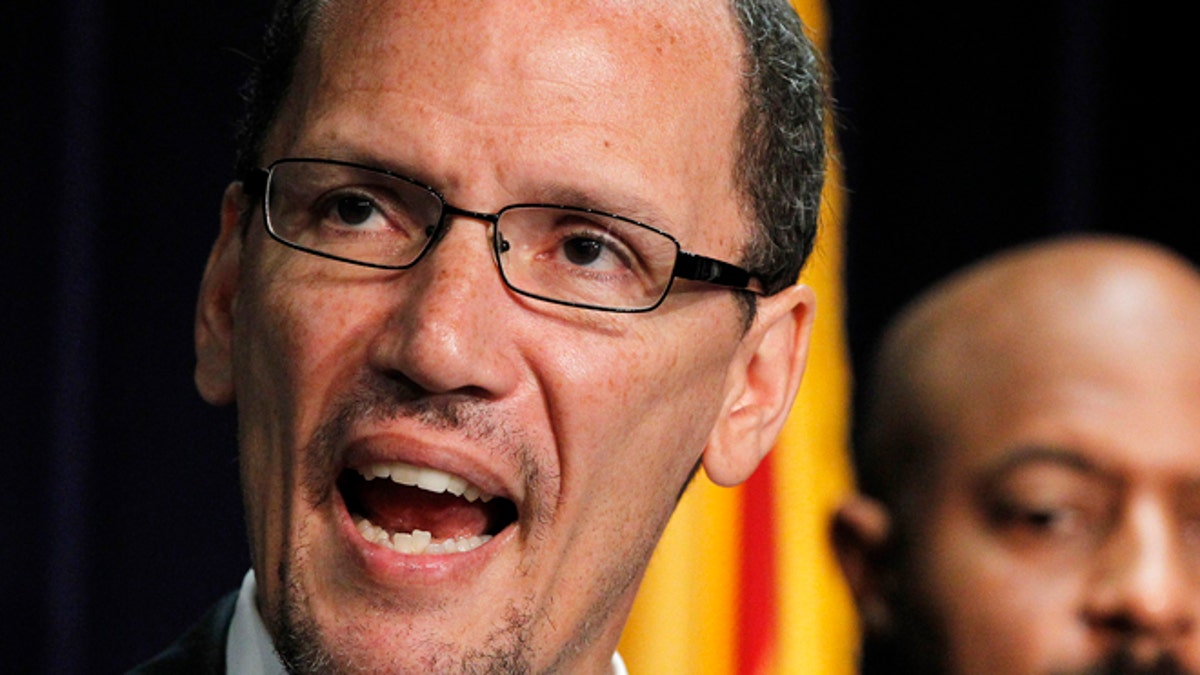
Labor Secretary nominee Thomas Perez (AP)
Labor secretary nominee Thomas Perez was confronted Thursday with tough questions about an alleged "secret deal" he cut with leaders from St. Paul, Minn., during his tenure as a top attorney at the Justice Department.
During Perez' confirmation hearing, Sen. Lamar Alexander, R-Tenn., accused the nominee of "manipulating" the system to get the result he wanted - and potentially costing taxpayers millions of dollars in the process.
According to a Republican report released earlier this week, Perez helped persuade St. Paul to drop a contentious lawsuit in exchange for the Justice Department staying out of whistleblower cases brought against the city. Perez' "quid pro quo" potentially cost taxpayers as much as $200 million, the report said.
"That seems to me to be an extraordinary amount of wheeling and dealing outside the normal responsibilities of the assistant attorney general for civil rights," said Alexander, who is the top Republican on the Senate panel screening Perez' nomination.
"It seems you have a duty to the government to collect the money, a duty to protect the whistleblower who's kind of left hanging in the wind."
Both cases involved the city of St. Paul. The 67-page report states that the Justice Department's decision to opt out of the whistleblower cases potentially cost taxpayers as much as $200 million -- the amount the government could have won had it pursued damages in the case.
But, according to the report, the Justice Department stayed away from that case in order to get the city to drop an appeal to the Supreme Court on another matter. The department was allegedly concerned that the high court, in the course of reviewing that case, would strike down a major element of civil rights enforcement.
The case the Justice Department was allegedly concerned about was St. Paul's appeal on a case in which property owners said the city made extraordinary efforts, through strict code enforcement, to condemn their properties. The owners said reducing the amount of affordable housing for minorities violated the federal Fair Housing Act -- by what is known as "disparate impact."
Perez appeared to think the Supreme Court overturning the case would have been a severe blow to civil rights enforcement, the report concluded.
The "disparate impact" provision, which the report described as legally questionable, prohibits housing policies that end up discriminating against certain groups even if those policies are not blatantly discriminatory.
Perez acknowledged Thursday that he thought that case "was a poor vehicle for the Supreme Court to address the broad issue."
Asked why he intervened, he said "The Department of Justice is really a guardian of the Fair Housing Act."
Alexander retorted: "Well, the Department of Justice is a guardian of taxpayers as well."
But Perez noted that the value of a losing case would have been zero, and said Justice attorneys made a "considered judgment" that the case was weak.
"The decisions made in this case were in the best interest of the United States," he said.
Sen. Tom Harkin, D-Iowa, chairman of the committee, defended Perez against the criticism.
"I think it's clear the department made the right call," he said, adding Perez acted "ethically."
He noted that Perez consulted with ethics officials on the decision and reiterated that attorneys decided not to intervene in the other case because it lacked merit.
Perez, in his testimony, also stressed his own personal story -- as the son of immigrants who escaped the dictatorship in the Dominican Republic -- and his commitment to job creation.
"Businesses will always be the primary generator of good jobs," he said.




